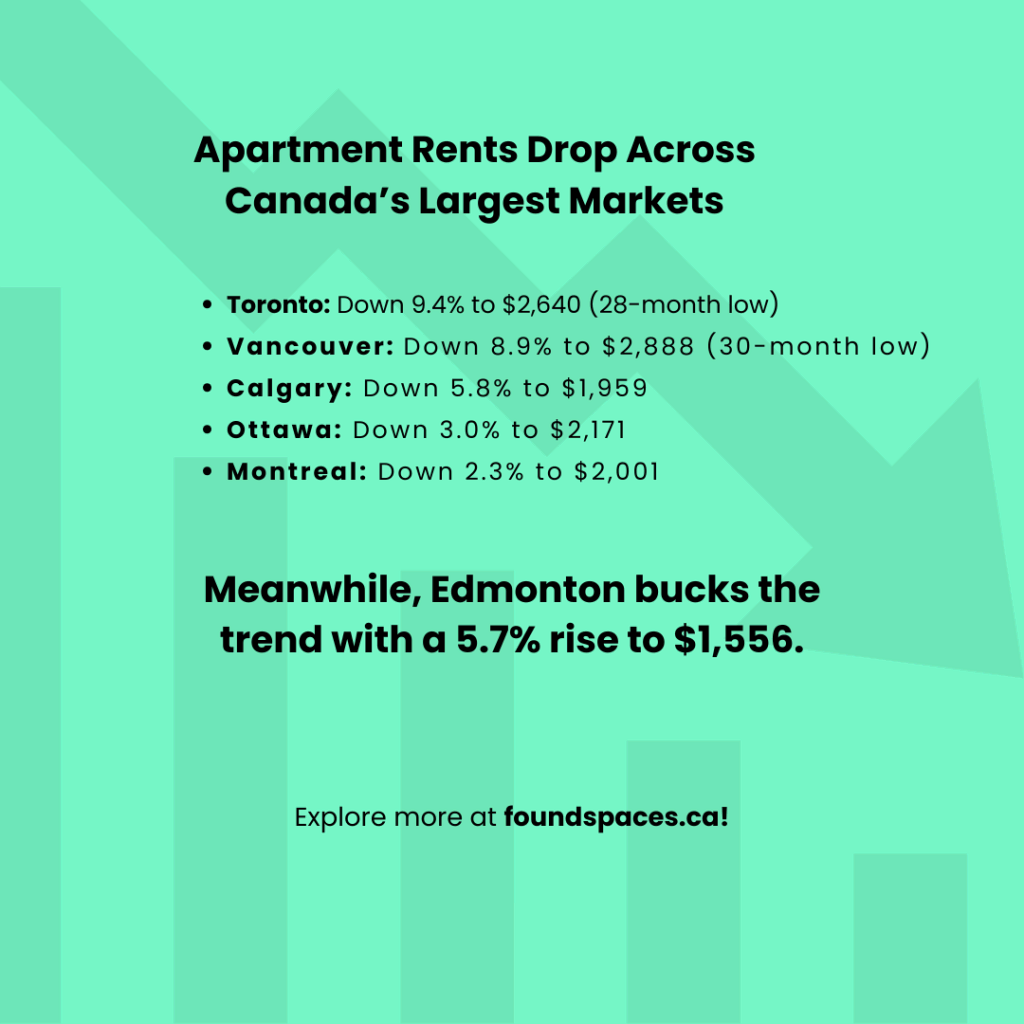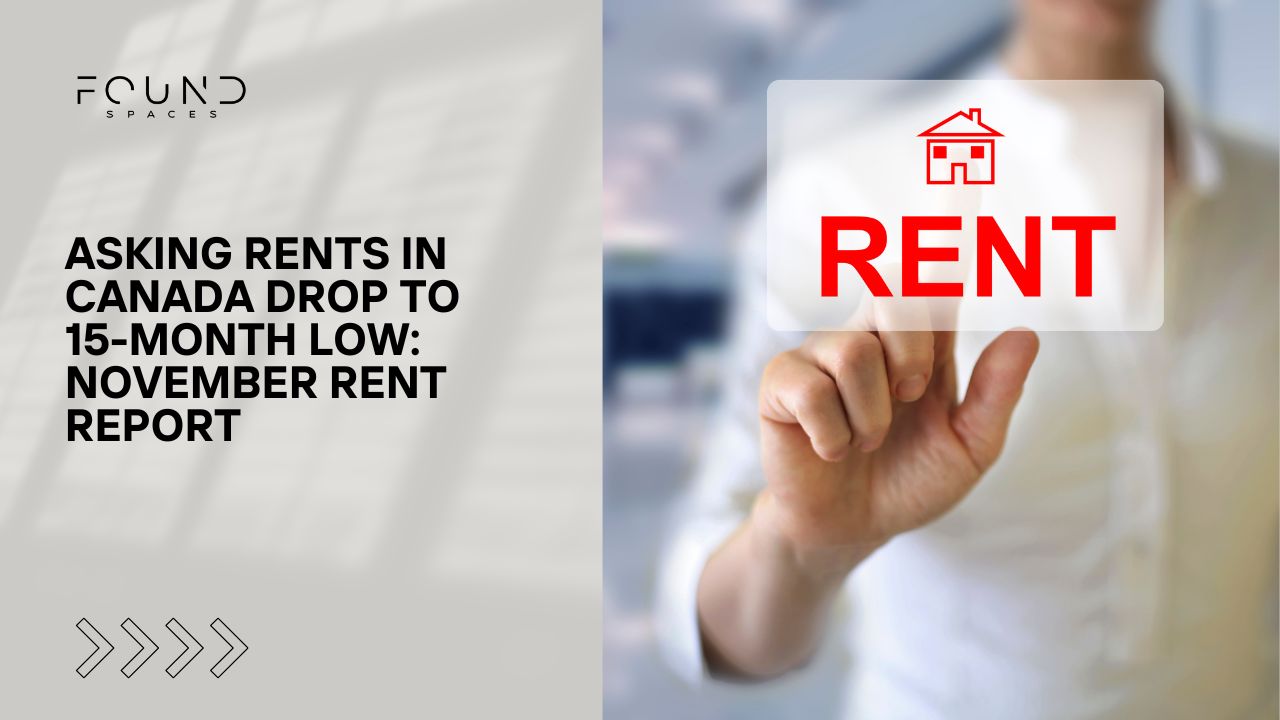After rents declined for the first time since 2021 in October, prices slipped even further in November, reaching a 15-month low.
By the end of the month, average asking rents for all unit types had hit $2,139, down 1.6% from last November and 0.6% from the previous month when rents had dropped 1.9%, according to the latest National Rent Report from Rentals.ca and Urbanation.
The report indicates that the year-over-year decline is mainly due to falling asking rents over the second half of 2024, with rents down 2.8% since July. This declining trend is encouraging for renters who have faced massive rent hikes in recent years, though rents remain 6.7% higher than two years ago and 18.8% higher than three years ago.
The report says that despite those declines, average rents in Canada are still 6.7% higher than two years ago and 18.8% higher than three years ago.
Urbanation president Shaun Hildebrand says rent declines are mainly focused within the secondary market for condos and houses, mostly in B.C. and Ontario, while purpose-built rents are stable.
Rent Declines Is Focused on One- And Two-Bedroom Units.
In November, the average asking rent for purpose-built and condominium apartments dipped by 0.2% year-over-year, settling at $2,120. Notably, one-bedroom apartment rents fell 1.2% to an average of $1,921, while two-bedroom rents decreased by 1.0% to $2,302. On the other hand, rents for studios and three-bedroom apartments bucked the trend, rising 5.0% and 5.1% annually to $1,629 and $2,965, respectively.
Condominium rents saw a sharper decline, dropping 4.0% over the year to an average of $2,239. Meanwhile, purpose-built apartment rents showed modest growth, up 0.7% annually to $2,102. Studio rents climbed 5.8% to $1,617 within the purpose-built market, and three-bedroom rents rose 5.9% to $2,676. However, one-bedroom rents declined slightly by 0.6% to $1,904, while two-bedroom rents remained unchanged at $2,294.
Rent decreases were widespread across condo apartment types, except for three-bedroom units, which increased by 1.9% year-over-year to an average of $2,936. Two-bedroom condo units saw the steepest annual decline, falling 4.3% to an average of $2,344.

Ontario Leads The Drop-In Apartment Rents
Ontario experienced the sharpest annual rent decline among provinces in November, with average rents falling 6.4% to $2,351, accelerating from a 5.7% drop in October. In British Columbia, rent declines slowed, with rents decreasing by 2.3% year-over-year to an average of $2,524, compared to October’s 3.4% drop. Quebec saw minimal declines, with rents slipping just 0.4% to $1,969.
Other provinces bucked the downward trend, with Saskatchewan leading annual rent growth for the eighth consecutive month. Rents in the province surged 12.1% to an average of $1,361. Alberta, however, saw a significant slowdown in rent growth, which fell to a 3.7% annual increase in November compared to a 10.3% pace in September.
Regional Trends in Rent Changes
In B.C., rent declines were concentrated in smaller units, with studio rents dropping 6.0% to $1,962 and one-bedroom rents falling 4.6% to $2,211. In contrast, two-bedroom rents edged up 0.5% to $2,852, while three-bedroom rents grew by 2.0% to $3,442.
Ontario’s rent declines were more widespread, impacting all unit types. Two-bedroom apartments saw the steepest drop, falling 7.6% year-over-year to an average of $2,591.
Asking Rents Decline in Canada’s Largest Cities
Apartment rents have fallen across Canada’s five largest markets over the past year, led by Toronto, where rents dropped 9.4% year-over-year to an average of $2,640—a 28-month low. Vancouver also saw significant declines, with rents falling 8.9% annually to $2,888, marking a 30-month low. Calgary experienced a 5.8% drop, bringing average rents to $1,959, while Ottawa saw a 3.0% decrease to $2,171. Montreal rounded out the group with a 2.3% decline, bringing average rents to $2,001.
Meanwhile, Edmonton, Canada’s sixth-largest market, continued to buck the trend, with rents rising 5.7% year-over-year to $1,556, though the pace slowed from October’s 8.4% increase.
Two-bedroom units saw the steepest declines in Toronto and Vancouver, dropping 10.2% and 11.4%, respectively, to $3,115 and $3,507. Vancouver also recorded double-digit declines for one-bedroom apartments (-11.7% to $2,555) and studios (-11.0% to $2,229).

Alberta And Saskatchewan Lead in Affordability
Alberta and Saskatchewan remain home to Canada’s most affordable rental markets. Lloydminster is the least expensive city, with an average rent of $1,200, followed by Fort McMurray at $1,302 and Regina at $1,368. Windsor is the only Ontario city among the ten least expensive markets, with an average rent of $1,644.
In contrast, B.C. dominates the list of priciest mid-sized markets, including North Vancouver ($3,222), Coquitlam ($2,979), and Richmond ($2,784). Ontario cities like Oakville ($2,917), Mississauga ($2,568), and Richmond Hill ($2,604) also rank among the most expensive.
Rent Changes Focused on B.C. And Ontario
While Saskatchewan led the country in rent growth (+17.6%), many cities in B.C. and Ontario experienced declines. Burnaby (-9.8%), Surrey (-8.1%), and North Vancouver (-7.5%) were among the hardest hit, alongside Ontario’s Vaughan (-7.4%). Cote Saint-Luc recorded the sharpest drop nationwide (-20.4%), largely attributed to a shift toward lower-cost listings.
Shared Accommodation Rents Stabilize Nearly $1,000
Demand for shared accommodations grew, with listings rising 52% year-over-year in November. The national average rent for shared housing increased by 3.9%, reaching $997.
B.C. led rent growth in this category, with a 4.7% increase to $1,174, followed by Ontario (+3.8% to $1,108). In contrast, shared accommodation rents rose only modestly in Quebec (+1.1% to $933) and Alberta (+0.2% to $879).
Notably, shared accommodation rents in Toronto dropped 9.5% to $1,196, while Montreal saw a 4.1% decline to $917. In Ottawa, however, rents increased by 6.4% to $1,045, driven by a surge in townhouse rental listings.




